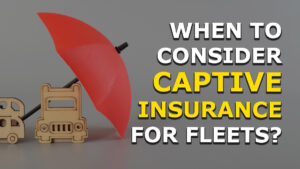
If you are a truck driver interested in starting your own owner-operator business, there are many things you can do now to help you keep your commercial insurance rates as low as possible whenever you go solo.
As a carrier driver, the earlier you can build your safe driving history, the better underwriters will measure the risk when they insure your new business.
The best thing you can do now are:
- Have a good credit score
- Have a clean-as-possible Motor Vehicle Record (MVR)
- Have no distracted driving tickets, speeding tickets over 25 mph, or at-fault rear-end accidents
- Have no auto insurance liability or physical damage claims while an employee driver for a carrier
- Have CDL experience for at least 1 to 5 years
- Have your license in the same state you reside in
- Establish your business in the same state you reside in
You are probably wondering, how does all of this affect my potential future business. Well, allow us to explain further.
Credit score: A higher credit score means a better rating.
The theory with credit is that if you manage your personal financial affairs well, you are more likely to take your driving and safety seriously.
Be sure to pay your bills on time, including mortgages or rent, credit cards, auto insurance, and car or truck payments.
FREE GUIDE | 7 Steps To Start and Run A Successful Trucking Company
Another way to keep your credit score high is to make sure your credit utilization rate is below 30%, if possible. For example, if you have a credit card account with a $10,000 limit and a $5,000 balance on the card, your credit utilization rate is 50%.
This means making sure you pay down any credit to below 30% of your total credit limit available to you.
Another option is to ask for your credit card limit be increased on a card or two to make the credit utilization rate lower quickly.
Motor Vehicle Record or MVR Report: Your MVR has the most significant impacts on our insurance premiums.
For example, if you get two or more speeding tickets or other moving violations in a three-year period, you can count on a rate increase at most insurance companies.
A Motor Vehicle Record (MVR) is a state-specific document that shows your driving history within that particular state over a period of time.
Typical MVR reports show 3 years up to 10 years of driving history, such as:
- Accident reports
- Driver restrictions
- Civil traffic violations, like speeding and running a red light
- License suspensions
- Vehicular crimes like DUI, reckless driving, and leaving the scene of an accident
- Unpaid summons and insurance lapses
- Number of points (in states that use a point system)
If you have a history of issues on your MVR, you can change your driving habits today and wait to get your authority until the violations drop off your MVR. Within three years, most speeding tickets will fall off your driving record and then may qualify you for a safe driving discount if your insurer offers one.
Location is important: It is best practice to live and have your driver’s license in the same state that your business will be located in.
If your place of business has an address in Pennsylvania, the insurance company expects your driver’s license to be in Pennsylvania as well.
Additionally, if you declare to the insurance company on our application that you are going to operate within a 500-mile radius of your Pennsylvania place of business, yet have a Florida driver’s license, that causes yet another unexpected mismatch.
If there is a mismatch, you will almost always see a significant insurance premium increase.
Comprehensive Loss Underwriting Exchange: If you have a history of insurance claims in either commercial or personal vehicles, it will be immediately evident, with adverse and severe implications for your commercial auto insurance (trucking insurance) premium.
When it comes to commercial auto insurance, both liability and physical damage insurance claims are viewed through two lenses.
- All paid claims are considered an accident, even if there was no police report
- The higher the amount paid to settle the claim, the higher the risk for insurance companies
How we keep new trucking company rates down
If you are ready to go solo, we recommend you start a custom quote online or call us directly at 800.724.5523 to speak with a licensed commercial trucking insurance professional. Filling out a complete quote or quick quote will help to get things rolling.
We also assist trucking companies and haulers of all types with the necessary compliance advice that comes with owning a trucking company.
Our sister-company, Compliance Navigation Specialists, is an industry leading compliance company that will help keep you in compliance and commercial insurance rates low.
Their DOT Compliance Specialists are well-versed in the FMCSA rules and regulations and offer a number of services for you.
A PSM DOT Essentials Program is designed to keep motor carriers compliant with the basic DOT regulations that nearly all carriers must follow.
For more information, contact CNS at 888.260.9448 or info@cnsprotects.com.





